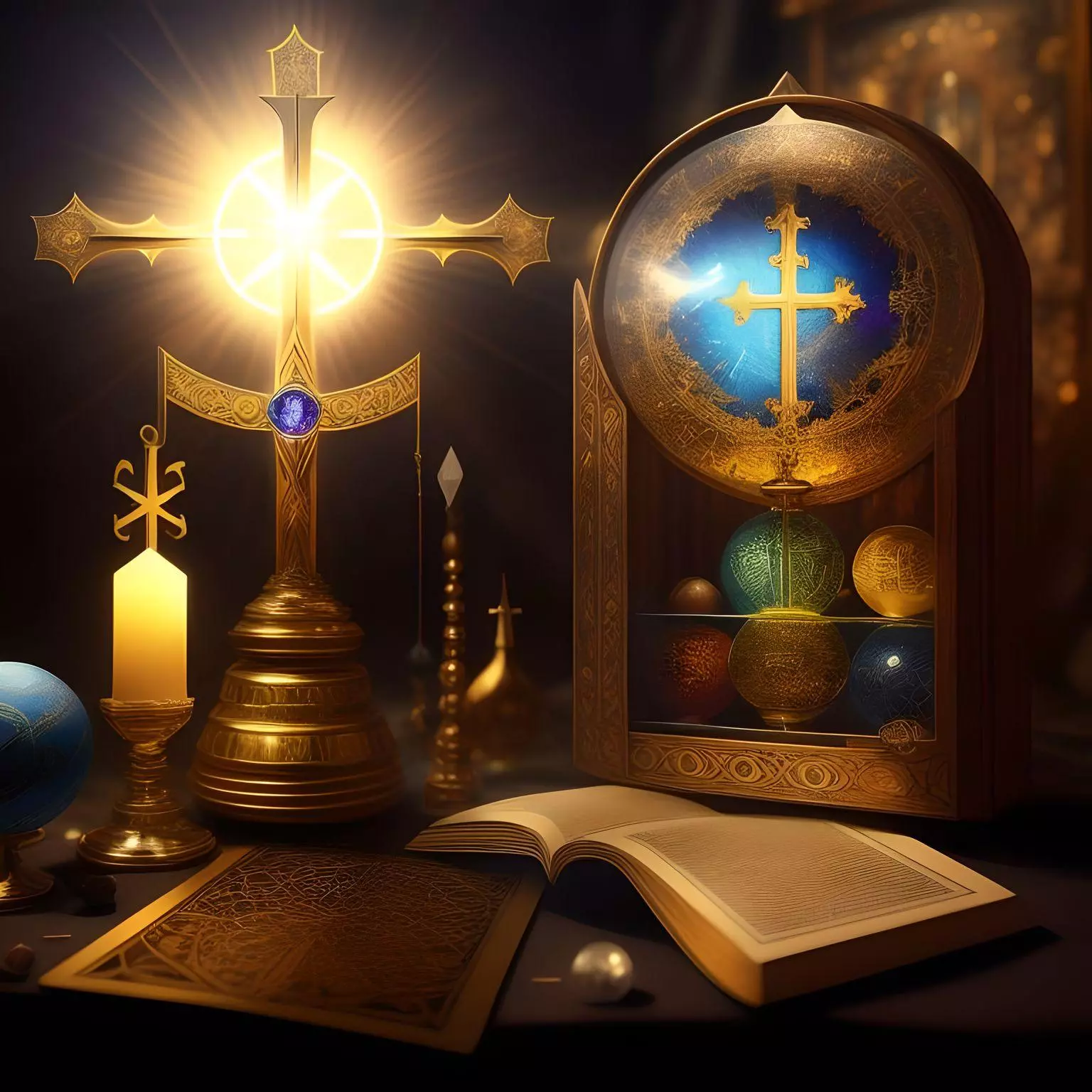As someone who cherishes the wisdom of the Bible, I can’t help but delve into its rich and intricate teachings. One topic that often sparks curiosity and debate is ‘divination’. Is divination in the bible allowed in the context?
This question, while seemingly straightforward, actually opens up a world of exploration into biblical history, Christian theology, and spiritual practices.
Let me guide you through this complex subject with compassion and understanding.
We’ll explore references to divination within both the Old and New Testaments, look at notable biblical figures associated with divinatory actions, unpack various Christian perspectives on divination, consider the role of prophecy in Christianity and finally distinguish between divine revelation and divination.
As we embark on this journey together, let us approach each aspect with an open heart and mind.
Understanding the Concept of Divination
Imagine yourself peering into a crystal ball, trying to decipher the future – that’s essentially what divination is all about. It’s an ancient practice, with its origins rooted deep in human history.
Divination was utilized by many cultures as a way to seek guidance or predictions from the divine. It was seen as a connection between humans and gods. From reading tea leaves in Asia, casting bones in Africa, to consulting the Oracle of Delphi in Ancient Greece, divination took various forms across civilizations.
The heart of divination practices lies not just in predicting future events but also uncovering hidden knowledge and gaining insights into one’s life situation. The divinatory tools used can vary widely – tarot cards, runes, pendulums, astrological charts are just some examples. Each tool has its own unique language; interpreting their messages requires skill and intuition. But remember, these tools aren’t magical entities themselves but merely channels for acquiring wisdom.
Speaking of wisdom, let’s consider another critical aspect: Divination ethics. As someone who practices or seeks advice from divination, you should know that while we may be eager for answers about our futures, the spirit behind it must always be one of respect and responsibility towards ourselves and others involved. Also, remember that interpretations from divinatory tools can often be symbolic or metaphorical rather than literal. They provide guidance rather than fixed outcomes. Our free will and personal decisions still hold power over our destinies despite any insight gained from divination practices.
Old Testament References to Divination
You might be surprised to discover that the Old Testament contains numerous references to practices similar to fortune-telling, often leading to dramatic consequences.
Divination methods were part of many ancient practices, and they found their way into the cultural fabric of various societies mentioned in the Bible. It’s essential, though, to distinguish between the ways these methods were employed and how their use was perceived within different contexts.
The prophets’ divination in the Old Testament is a topic that invites intrigue. The prophets were known for receiving divine revelations and interpreting God’s will, which some may argue resembles divination. However, there is a distinct difference: Prophets received messages directly from God rather than attempting to manipulate spiritual forces or predict future events through rituals or objects as seen in traditional divination. Their role was not merely about predicting but guiding people according to divine instructions.
On another note, it’s noteworthy how seriously the Bible takes unlawful applications of divination. There are specific mentions of various forms of divination punishments for those who engaged in such activities without divine sanction. This can be seen as an indication of how detrimental unregulated spiritual practices can be when misused or abused due to cultural influences. The Old Testament teaches us that discernment is crucial when dealing with spiritual matters – not all that glitters is gold, so we must tread carefully on our faith journey.
New Testament References to Divination
Now, as we venture into the New Testament, let’s take a peek at how it handles matters of foretelling and spiritual discernment.
There are several instances where divination types come into play, most notably in Acts 16:16-18 when Paul encounters a slave girl with a spirit of divination. The story goes that she made her masters much profit by fortune-telling but upon meeting Paul, he rebukes the spirit within her and sets her free from its influence. This moment shows Paul’s clear stance against divination; he chooses to heal rather than to benefit from or engage with such practices.
Paul continues to share his views on this topic in the Corinthians texts where he urges Christians to seek after gifts of the Spirit instead of engaging in pagan practices like divination. In 1 Corinthians 12:10, he lists prophecy as one of these gifts—a godly alternative to fortune-telling. Prophecy here is understood not as predicting future events but as speaking God’s truth into people’s lives for their edification and encouragement. Therefore, while some might see similarities between prophecy and certain forms of divination, according to Paul’s teachings they are fundamentally different due to their source—one originates from God while the other stems from darker spiritual influences.
Looking at Apostles’ views across various books in the New Testament also reinforces this strong opposition towards any form of divination. Those who practiced it were often seen as misguided or under demonic influence; their activities had dire consequences both spiritually and physically—such as being struck blind or falling into depravity. The Apostles urged believers instead towards faithfulness, prayerfulness, and reliance on God over any type of mystical foresight or attempts at controlling fate through supernatural means.
So remember my dear friends that our hope should always lie not in predicting our future but placing trust firmly in God who holds all our tomorrows.
Notable Biblical Figures and Divinatory Actions
Reflect on the many individuals in scripture who, despite their flaws and misguided attempts at foreseeing the future, were used mightily by God to accomplish His divine plan.
Take for instance Joseph, a man whose dreams and interpretations not only saved his family during famine but also led to his rise as a top official in Egypt. While some may argue that Joseph’s ability to interpret dreams could be classified as divination, it’s essential to recognize that this was a gift from God used for His purposes.
Similarly, Daniel had visions that accurately depicted future events. Yet again, these were not self-sought or manipulative acts of divination but rather prophetic revelations granted by God Himself.
Let us consider Saul’s consultation with the witch of Endor to communicate with dead Samuel – an act explicitly forbidden in Deuteronomy 18:10-12. This desperate attempt at divination led him further from God’s guidance and eventually resulted in his downfall. Misguided as he was, Saul serves as a cautionary tale about the dangers of seeking knowledge outside of God’s will.
In contrast stands Balaam whose prophecy over Israel came directly from Yahweh even though he was originally summoned by King Balak for curse-inflicting purposes.
The life of Samuel is another excellent example where we must carefully distinguish between divine revelation and human-led divination. Known for his predictions which always came true (1 Samuel 3:19), it is clear that Samuel did not engage in prohibited practices but merely delivered messages given by the Lord.
Therefore, while these biblical figures engaged in actions involving foresight or foreknowledge, their power originated not from occult practices or manipulation but from their relationship with the Creator Himself – A reminder that our strength lies not in our own understanding but solely within His divine wisdom and grace.
Christian Perspectives on Divination
As a follower of Christ, it’s vital to keep in mind the clear lines drawn by scripture regarding practices that attempt to predict or manipulate future events. The Christian criticism of divination is grounded on the belief that only God holds the knowledge of the future and any human attempts at discerning this can lead us astray from His divine guidance.
Divination tools such as tarot cards, crystal balls, or even astrology are seen as mediums that might divert our trust and reliance on God’s providence and wisdom.
The morality debate surrounding divination within Christianity stems from a deep concern for spiritual well-being. As believers, we’re called to seek guidance and wisdom directly from God through prayer, reading scripture, and heeding the counsel of mature Christians instead of resorting to questionable methods.
Biblical interpretations caution against divination because it can create a false sense of control over life’s uncertainties and distract us from seeking solace in God’s sovereignty.
The consequences of divination aren’t merely metaphysical; they touch upon our relationship with God. When we engage in these practices, we risk distancing ourselves from Him by not acknowledging His ultimate authority over all things known and unknown.
Instead of seeking answers through divinatory means, let’s cultivate a lifestyle where our faith is rooted deeply in God’s word – trusting Him with every aspect of our lives while living out His commands faithfully. In doing so, we not only uphold biblical teachings but also find true peace amidst life’s uncertainties.
The Role of Prophecy in Christianity
You might be wondering about the role of prophecy in Christianity, especially given its striking similarities with divination. Prophecy holds a significant place in Christianity and is often misunderstood due to common misconceptions.
Unlike divination, which seeks to foretell future events through supernatural powers, Christian prophecy is about conveying God’s message as guided by the Holy Spirit. Prophetic interpretations aren’t merely predictions of the future but also include divine wisdom and moral teachings. The prophetic role isn’t about personal gain or manipulation; instead, it’s a call to service for God’s people.
The fulfillment of prophecies provides proof for Christians that God is indeed at work in the world. Prophecy fulfillment can sometimes be immediate while other times it takes years, even centuries to come into fruition. This demonstrates that God operates beyond our comprehension of time and space. However, these fulfillments are not always as literal as some might think – they often require deep spiritual discernment and understanding of symbolic language used in scriptures.
Prophetic influences have shaped Christianity immensely over centuries, helping believers understand their faith more profoundly and encouraging them towards righteous living based on divine guidance. It’s important to remember though that while prophecies play an essential role in Christianity, they shouldn’t supersede our direct relationship with Christ or become a source of division among believers. After all, love remains the greatest commandment above all else according to Jesus Himself: “”Love the Lord your God with all your heart and with all your soul and with all your mind… Love your neighbor as yourself.””
Distinguishing Between Divine Revelation and Divination
Navigating the line between divine revelation and other supernatural practices can be tricky, but it’s crucial for your understanding of spiritual matters. Divine inspiration, or God’s guidance, is often confused with divination – a practice that seeks to foretell future events or discover hidden knowledge through supernatural means. However, these two are fundamentally different in their source and purpose.
While divine inspiration comes directly from God and serves a higher purpose of spiritual growth and enlightenment, divination relies on lesser spiritual entities or energies and may not align with God’s will.
Developing your spiritual intuition can help you distinguish between prophetic visions delivered by God and attempts at divination. Prophetic visions are divine communications meant to guide us towards righteous actions or warn us about potential dangers. They are always consistent with the teachings of the Bible and promote love, justice, righteousness, and peace. On the contrary, messages obtained through divination do not necessarily adhere to biblical principles and may even lead one astray from God’s path.
It’s essential to remember that as believers we should seek wisdom first from God who guides us lovingly through life’s complexities rather than relying on potentially misleading methods like divination. Always scrutinize any purported revelations against the backdrop of scripture – if they contradict biblical teaching or seem self-serving rather than promoting communal well-being then they’re likely not genuine divine inspirations but something else entirely. Be discerning in your pursuit of spiritual insight – lean more into prayerful contemplation which opens doors for authentic divine communication instead of resorting to potentially deceitful practices like divination.
Conclusion
In my understanding, divination is not allowed according to the Bible. The scriptures repeatedly caution against seeking spiritual knowledge through practices like divination.
As a believer, I’m encouraged to seek wisdom from God alone.
While prophecy does play a significant role in Christianity, it’s important for me to remember that divine revelation is very different from divination. It’s a deep conviction of mine that trust and faith in God should be our guiding principles.




